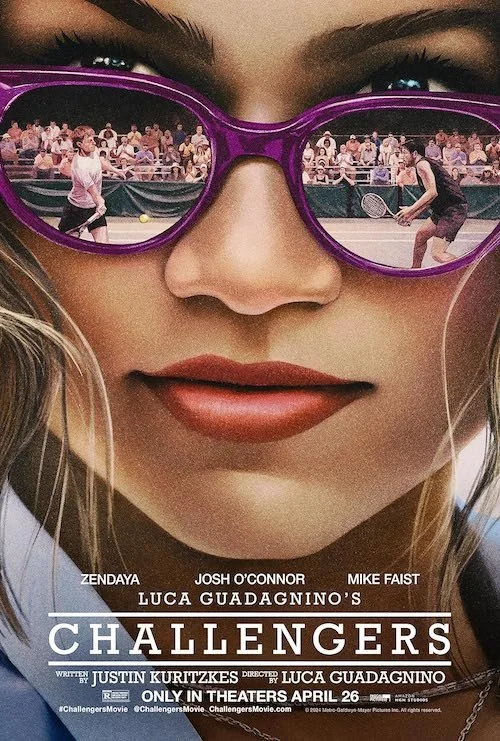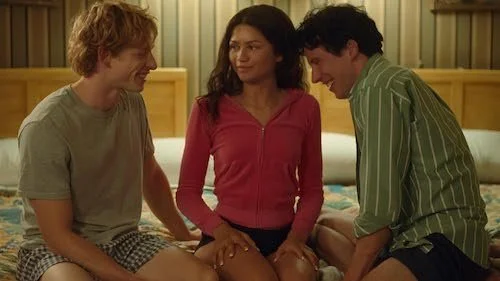Challengers
Written by Andreas Babiolakis
Tennis is one of the most visceral sports out there. You hear the exhaled grunt being knocked out of players as they put everything they’ve got into a serve or return. You see the occasional racket getting broken out of frustration against the hard court below, now garnished with sweat, tears, and the occasional blood from burst blisters. There’s no coach or team out there with the duellists (or battling pairs). It’s just the players, a ball, a net, and a test of stamina, wits, patience, and drive. Time doesn’t exist: games are determined by the wills and capabilities of those playing. I cannot profess to be a tennis expert, but the occasional match I catch a glimpse of reminds me why people love this sport so much. I also acknowledge that tennis happens to be one of the stronger sports to translate to the big screen because of how personal the sport feels to those playing. More often than not, these films also possess a romantic angle, because they’re nothing like the double meaning of the word “love” in romantic tennis films. Outside of this convenient pun, both tennis and romance are allegorical waltzes between those you are seeking out (a rival in tennis, and a suitor in love). In these films, you’re watching people try to gain control of their love lives and tennis matches, and the power shifts between these “players”, their surroundings, and their lives.
All the stars lined up for Luca Guadagnino’s latest film, Challengers, a romantic sports film that was meant for a 2023 release before the SAG-AFTRA strike took place. It is yet another example of how stacked that year was meant to be in film history, but at least we can now say that 2024 is following suit in calibre. With attention to a culture hinged on swiping right on dating apps, sexual exploration, polygamy, and social media pressure (particularly for athletes who now have to face the brutish scorn of toxic sports fans who need to let the world know that they stupidly bet money on a game and are now blaming those they bet on), Challengers rides on the unstoppable and unavoidable vibes that the pairing between tennis and calamitous love can bring. Yet another entry in the group of films that explore the concept of love triangles (Jules et Jim, Y tu mamá también, last year’s Past Lives, et cetera), Challengers aims to boil blood between two tennis pros and the prodigy who continuously finds herself stuck between them.
The players are Patrick Zweig (Josh O’Connor) and Art Donaldson (Mike Faist), who have been friends since they were teenagers (they even go by the catchy nicknames Fire and Ice). While they are on the rise of their respective — and combined (when they connect for doubles) — careers, they meet Tashi Duncan (Zendaya) who is the upcoming it-girl of tennis. After a get together, Patrick and Art find themselves somehow bringing Tashi to their hotel room. Before things get too spicy, Tashi makes the first serve: a pitch that whoever wins between the two men at their match the next day can get her number. Game on! Challengers gets far more complicated than this original premise, as it hops around from time periods and sequences, encouraging viewers to keep their head in the game, pay attention, and not get swept up in the aesthetics of the film alone.
On the note of the artistic qualities of Challengers, there’s a lot to get bowled over by, hence the necessary narrative nuances to keep you invested. The cinematography by Sayombhu Mukdeeprom (best known for his limbo-esque meditations in the films of Apichatpong Weerasethakul) truly shines here, as the Thai visionary equates his techniques to that of a tennis match (including dynamic wide shots that overwhelm us, back-and-forth quick pans during discussions, and various vantage points). Then there’s the much-discussed score by Trent Reznor and Atticus Ross which combines the fluttery euphoria of seventies and eighties disco (evoking the theatrical jubilation of sports films of its cheesiest age, with love of course) with the gut-punching lows when we plummet from our highs, perhaps because of devastating losses or life-changing injuries. Reznor and Ross adapted their usual electronic compositions for a sports film by both understanding how these motion pictures typically work, and — on the same page with Guadagnino — how they can be bettered. The end result — between cinematography and music — is a film that feels like a fever dream: the rush of being an athletic prospect at a young age, caught up in the hysteria of fame, love, and power, and having to face the bottomless pits of aging, losing, and heartbreak (be it at the hands of a partner or the fate of the game). Challengers also deals with the weights of being in the lead and lagging behind, in a game, in a relationship, and in life.
Challengers is an elevation of what sports dramas can be artistically, narratively, and tonally.
Back to how the film is told. Guadagnino — and screenwriter Justin Kuritzkes — understand what spectators find in sports. We watch a game not knowing the full backstory of what is going on in an athlete’s mind, especially as they try to drown out all of the noise. Challengers grants us the opportunity to suppose what is happening as we watch Patrick, Art, and/or Tashi play, We then get the answers as we cut back years, weeks, or days prior to matches (or afterwards, as we need to get back to the match that the entire film pivots around). Challengers leaps from time period to time period its entire duration, forever keeping you on your toes and ready for a speeding bullet of a serve that you need to be ready for. The editing work of Marco Costa helps provide some cohesion and partial linearity to a film that would otherwise be as broken as one of Marat Safin’s rackets, and any weaker of an editing job would have made Challengers feel convoluted and pretentious (it never feels either way).
Helping ground these narrative decisions are a trio of stellar performances. O’Connor and Faist are a given, seeing as their performances are quite consistent. Zendaya is someone who I think needs a good mentor to truly shine, and when she does (Euphoria, Dune: Part Two), she can be truly captivating. With that said, she is at her very best here as Tashi, as she is fully believable as a promising sports superstar whose career — and love life — have taken many unexpected twists. It’s one thing for a film to be aesthetically rich; it’s another for it to be engrossing as a stage for actors and a director to deliver a strong script as well. Guadagnino is willing to get melodramatic in his own cheeky way as well so he can at least have a bit of the fun that sports films have to offer, including a highly on-the-nose sequence involving a whirlwind romance (it’s exactly what it sounds like, and you’ll know what I mean when you get there). These tongue-in-cheek moments are earned considering how frequently Challengers marches to the beat of its own drum, and they act as reminders of self-awareness: this romance and this sport mean everything to these three protagonists, but to us these are merely games.
Why do we play sports? They’re fun until they get serious. Then it becomes a toss-up: do we devote our life to them, or do we quit and opt for a different life? As Tashi toys with Patrick and Art, she finds that the game is no longer fun and that this new sport she has discovered (one of romantic conflicts) is one that her heart is set on now. Her two male suitors are finding the same outcome. Relationships are equatable to sports in this way. We start out looking for a bit of fun until we are presented with the inevitable: the turning point of life commitment or the refusal of such. Guadagnino has nailed his latest film, his best since 2017’s Call Me by Your Name. Challengers is a constant mood of rushing blood, uncertainty, and leisure that turns into danger with consequences. We can thank the backlogging of 2023 for this gift, as Challengers is another film that has set the bar for 2024 quite high via its refusal to back down on its identity and ambitions. In a genre so often plagued by corniness and fabrication, Challengers proves that sports films don’t have to feel predictable or typical. The rush of sports is not knowing what is going to happen. Challengers carry out this concept until the match point for the game is reached and earned.
Andreas Babiolakis has a Masters degree in Film and Photography Preservation and Collections Management from Ryerson University, as well as a Bachelors degree in Cinema Studies from York University. His favourite times of year are the Criterion Collection flash sales and the annual Toronto International Film Festival.







